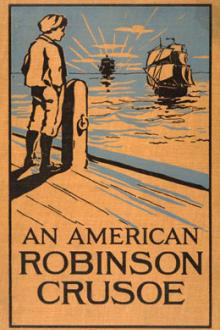Memoirs of a Cavalier<br />A Military Journal of the Wars in Germany, and the Wars in England.<br />, Daniel Defoe [phonics books TXT] 📗

- Author: Daniel Defoe
Book online «Memoirs of a Cavalier<br />A Military Journal of the Wars in Germany, and the Wars in England.<br />, Daniel Defoe [phonics books TXT] 📗». Author Daniel Defoe
We ventured to stay all day at this town and the next night, and got guides to lead us to Blackstone Edge, a ridge of mountains which part this side of Yorkshire from Lancashire. Early in the morning we marched, and kept our scouts very carefully out every way, who brought us no news for this day. We kept on all night, and made our horses do penance for that little rest they had, and the next morning we passed the hills and got into Lancashire, to a town called Littlebrough, and from thence to Rochdale, a little market town. And now we thought ourselves safe as to the pursuit of enemies from the side of York. Our design was to get to Bolton, but all the county was full of the enemy in flying parties, and how to get to Bolton we knew not. At last we resolved to send a messenger to Bolton; but he came back and told us he had with lurking and hiding tried all the ways that he thought possible, but to no purpose, for he could not get into the town. We sent another, and he never returned, and some time after we understood he was taken by the enemy. At last one got into the town, but brought us word they were tired out with constant alarms, had been strictly blocked up, and every day expected a siege, and therefore advised us either to go northward where Prince Rupert and the Lord Goring ranged at liberty, or to get over Warrington Bridge, and so secure our retreat to Chester.
This double direction divided our opinions. I was for getting into Chester, both to recruit myself with horses and with money, both which I wanted, and to get refreshment, which we all wanted; but the major part of our men were for the north. First they said there was their general, and 'twas their duty to the cause, and the king's interest obliged us to go where we could do best service; and there was their friends, and every man might hear some news of his own regiment, for we belonged to several regiments. Besides, all the towns to the left of us were possessed by Sir William Brereton, Warrington, and Northwich, garrisoned by the enemy, and a strong party at Manchester, so that 'twas very likely we should be beaten and dispersed before we could get to Chester. These reasons, and especially the last, determined us for the north, and we had resolved to march the next morning, when other intelligence brought us to more speedy resolutions. We kept our scouts continually abroad to bring us intelligence of the enemy, whom we expected on our backs, and also to keep an eye upon the country; for, as we lived upon them something at large, they were ready enough to do us any ill turn, as it lay in their power.
The first messenger that came to us was from our friends at Bolton, to inform us that they were preparing at Manchester to attack us. One of our parties had been as far as Stockport, on the edge of Cheshire, and was pursued by a party of the enemy, but got off by the help of the night. Thus, all things looked black to the south, we had resolved to march northward in the morning, when one of our scouts from the side of Manchester, assured us Sir Thomas Middleton, with some of the Parliament forces and the country troops, making above 1200 men, were on the march to attack us, and would certainly beat up our quarters that night. Upon this advice we resolved to be gone; and, getting all things in readiness, we began to march about two hours before night. And having gotten a trusty fellow for a guide, a fellow that we found was a friend to our side, he put a project into my head which saved us all for that time; and that was, to give out in the village that we were marched to Yorkshire, resolving to get into Pontefract Castle; and accordingly he leads us out of the town the same way we came in, and, taking a boy with him, he sends the boy back just at night, and bade him say he saw us go up the hills at Blackstone Edge; and it happened very well, for this party were so sure of us, that they had placed 400 men on the road to the northward to intercept our retreat that way, and had left no way for us, as they thought, to get away but back again.
About ten o'clock at night, they assaulted our quarters, but found we were gone; and being informed which way, they followed upon the spur, and travelling all night, being moonlight, they found themselves the next day about fifteen miles east, just out of their way. For we had, by the help of our guide, turned short at the foot of the hills, and through blind, untrodden paths, and with difficulty enough, by noon the next day had reached almost twenty-five miles north, near a town called Clitheroe. Here we halted in the open field, and sent out our people to see how things were in the country. This part of the country, almost unpassable, and walled round with hills, was indifferent quiet, and we got some refreshment for ourselves, but very little horse-meat, and so went on. But we had not marched far before we found ourselves discovered, and the 400 horse sent to lie in wait for us as before, having understood which way we went, followed us hard; and by letters to some of their friends at Preston, we found we were beset again.
Our guide began now to be out of his knowledge, and our scouts brought us word, the enemy's horse was posted before us, and we knew they were in our rear. In this exigence, we resolved to divide our small body, and so amusing them, at least one might get off, if the other miscarried. I took about eighty horse with me, among which were all that I had of our own regiment, amounting to above thirty-two, and took the hills towards Yorkshire. Here we met with such unpassable hills, vast moors, rocks, and stonyways, as lamed all our horses and tired our men; and some times I was ready to think we should never be able to get over them, till our horses failing, and jackboots being but indifferent things to travel in, we might be starved before we should find any road, or towns; for guide we had none, but a boy who knew but little, and would cry when we asked him any questions. I believe neither men nor horses ever passed in some places where we went, and for twenty hours we saw not a town nor a house, excepting sometimes from the top of the mountains, at a vast distance. I am persuaded we might have encamped here, if we had had provisions, till the war had been over, and have met with no disturbance; and I have often wondered since, how we got into such horrible places, as much as how we got out. That which was worse to us than all the rest, was, that we knew not where we were going, nor what part of the country we should come into, when we came out of those desolate crags. At last, after a terrible fatigue, we began to see the western parts of Yorkshire, some few villages, and the country at a distance looked a little like England, for I thought before it looked like old Brennus Hill, which the Grisons call "the grandfather of the Alps." We got some relief in the villages, which indeed some of us had so much need of, that they were hardly able to sit their horses, and others were forced to help them off, they were so faint. I never felt so much of the power of hunger in my life, for having not eaten in thirty hours, I was as ravenous as a hound; and if I had had a piece of horse-flesh, I believe I should not have had patience to have staid dressing it, but have fallen upon it raw, and have eaten it as greedily as a Tartar. However I ate very cautiously, having often seen the danger of men's eating heartily after long fasting.
Our next care was to inquire our way. Halifax, they told us, was on our right. There we durst not think of going. Skipton was before us, and there we knew not how it was, for a body of 3000 horse, sent out by the enemy in pursuit of Prince Rupert, had been there but two days before, and the country people could not tell us whether they were gone, or no. And Manchester's horse, which were sent out after our party, were then at Halifax, in quest of us, and afterwards marched into Cheshire. In this distress we would have hired a guide, but none of the country people would go with us, for the Roundheads would hang them, they said, when they came there. Upon this I called a fellow to me, "Hark ye, friend," says I, "dost thee know the way so as to bring us into Westmoreland, and not keep the great road from York?" "Ay, merry," says he, "I ken the ways weel enou!" "And you would go and guide us," said I, "but that you are afraid the Roundheads will hang you?" "Indeed would I," says the fellow. "Why then," says I, "thou hadst as good be hanged by a Cavalier as a Roundhead, for if thou wilt not go, I'll hang thee just now." "Na, and ye serve me soa," says the fellow, "Ise ene gang with ye, for I care not for hanging; and ye'll get me a good horse, Ise gang and be one of ye, for I'll nere come heame more." This pleased us still better, and we mounted the fellow, for three of our men died that night with the extreme fatigue of the last service.
Next morning, when our new trooper was mounted and clothed we hardly knew him; and this fellow led us by such ways, such wildernesses, and yet with such prudence, keeping the hills to the left, that we might have the villages to refresh ourselves, that without him, we had certainly either perished in those mountains, or fallen into the enemy's hands. We passed the great road from York so critically as to time, that from one of the hills he showed us a party of the enemy's horse who were then marching into Westmoreland. We lay still that day, finding we were not discovered by them; and our guide proved the best scout that we could have had; for he would go out ten miles at a time, and bring us in all the news of the country. Here he brought us word, that York was surrendered upon articles, and that Newcastle, which had been surprised by the king's party, was besieged by another army of Scots advanced to help their brethren.
Along the edges of those vast mountains we passed with the help of our guide, till we came into the forest of Swale; and finding ourselves perfectly concealed here, for no soldier had ever been here all the war, nor perhaps would not, if





Comments (0)